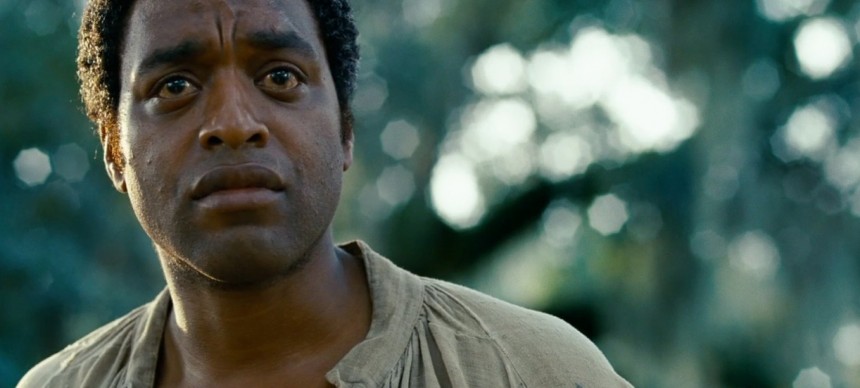By Curtis Caesar John
It is seldom that a film can effectively both disturb and marvel you at the same time. Yet director Steve McQueen, who in his first two films explored the life of a sex addicted man with fiercely secret family problems in Shame (2011), and an jailed Irish republican who leads his fellow inmates on a long and enduring hunger strike in Hunger (2008), managed to do so in his first two brilliant films and accomplishes this feat, and more, in 12 Years a Slave.
In McQueen’s powerful adaptation of the memoir of Solomon Northup, a free born and multi-talented Black man from Saratoga, NY is lured by work to Washington D.C. and abducted into slavery in the Deep South in 1841. During the next twelve years we follow Solomon’s journey as he learns first-hand the physical and mental atrocities of slavery. He first intends to revolt and earn his freedom, but the revolt is easily stopped and he is brought to Louisiana and sold alongside others in embarrassing cattle-like trading where captured families are quickly and easily separated. Still Solomon, played by the always brilliant Chiwetel Ejiofor (American Gangster, Inside Man), tries to maintain some form of dignity while working for kindly farmer William Ford (Benedict Cumberbatch – The Fifth Estate, Star Trek: Into Darkness) and feels confident he can win out and escape with his know-how and charm. But due to his outspokenness toward Ford’s carpenter (Paul Dano – Being Flynn, Little Miss Sunshine ), Solomon is soon sold to merciless cotton farmer Edwin Epps (Michael Fassbender – Prometheus, X-Men: First Class), whose horrifying acts against his slaves embody the grimmest savagery of slavery, breaking Solomon’s body and spirit.
McQueen does not hold back on the barbarity of physical violence – the beatings and whippings are the harshest you’ll ever see in a movie about slavery – but also mental violence inflicted upon Solomon and the slave community, including through religion. It is not McQueen’s style to hold back but to jolt his audiences into unwrapping the truth of his characters and their situations. He elevates cinema to a higher level with each new project. Ejiofor does a flawless job of carrying the emotional impact of 12 Years, but it is Kenyan actress Lupita Nyong’o in the role of Patsey, Epps’ favorite cotton picker and bed wench, who audiences will come to both love and feel deep empathy for as she tries to survive the grips of Epps and the scorn of his wife Mary (Sarah Paulson – Mud, 2012). The diminutive but commanding Nyong’o steals the movie.

Meanwhile Fassbender , who starred in McQueen’s first two films, has delivered for the director once more. They both owe their careers to one another and their commitment to making each other a better artist is clear. Be sure to also look out for the impactful performances from Alfre Woodard, Michael K. Williams, Chris Chalk, Garret Dillahunt, and Brad Pitt, who was also a producer on the film. McQueen along with John Ridley’s screenplay has crafted what is perhaps 2013’s most powerful film.
A film like this provides a renewed introspection into the United States’ psyche and her hegemonic denial of slavery’s long-lasting effects on all who live here. Debates about the accuracy of slavery in 12 Years and the portrayal of violence have already curiously surfaced, yet in an interview McQueen did with Film.com’s Calum Marsh, the director remarks, “If I was to illustrate the book — I’m not an illustrator — it would be far more worse than what I filmed. “
But even more questions arise, some with no easy answers.
As a writer whose focus is most often on Black media culture, I am left to wonder if this film would be as critically loved or even acknowledged if it did not have white star actors in key roles. Does having Brad Pitt as a producer and actor in the film lend legitimacy towards McQueen’s work? I am not saying that it does not stand on its own, McQueen’s work always has and quite frankly he is on track toward becoming an auteur. But I am also not the one making editorial decisions in major print or online publications or greenlighting films. I’m reminded of the recent film The Butler, which in execution pales in comparison to 12 Years, but also had its white actors at the forefront of the advertising campaign. Similarly, The Butler and 12 Years’ main poster is more silhouette than actual raw Black male image – though at least with the latter you can make out Ejiofor as the main man.
As I said, questions with no easy answers save one. You must see this movie.
Twelve Years a Slave
Runtime: 2 hr 14 min
Opens: Oct. 18, 2013 in New York City, Los Angeles, Chicago, Washington D.C., Atlanta, and Toronto
Cast: Chiwetel Ejiofor, Lupita Nyong’o, Michael Fassbender, Brad Pitt, Alfre Woodard, Benedict Cumberbatch, Paul Dano, Paul Giamatti, Adepero Oduye, Garret Dillahunt, and Michael K. Williams
Director: Steve McQueen
Additional links:



